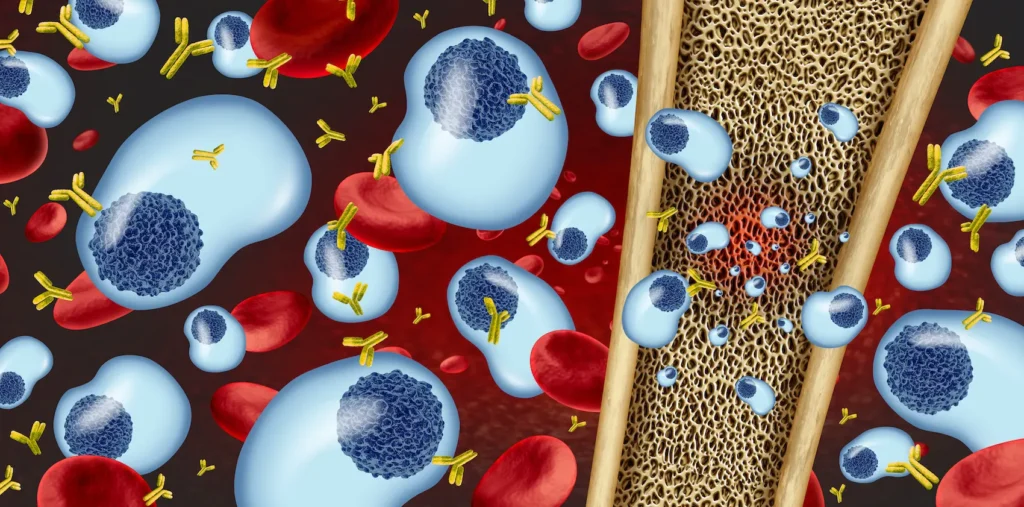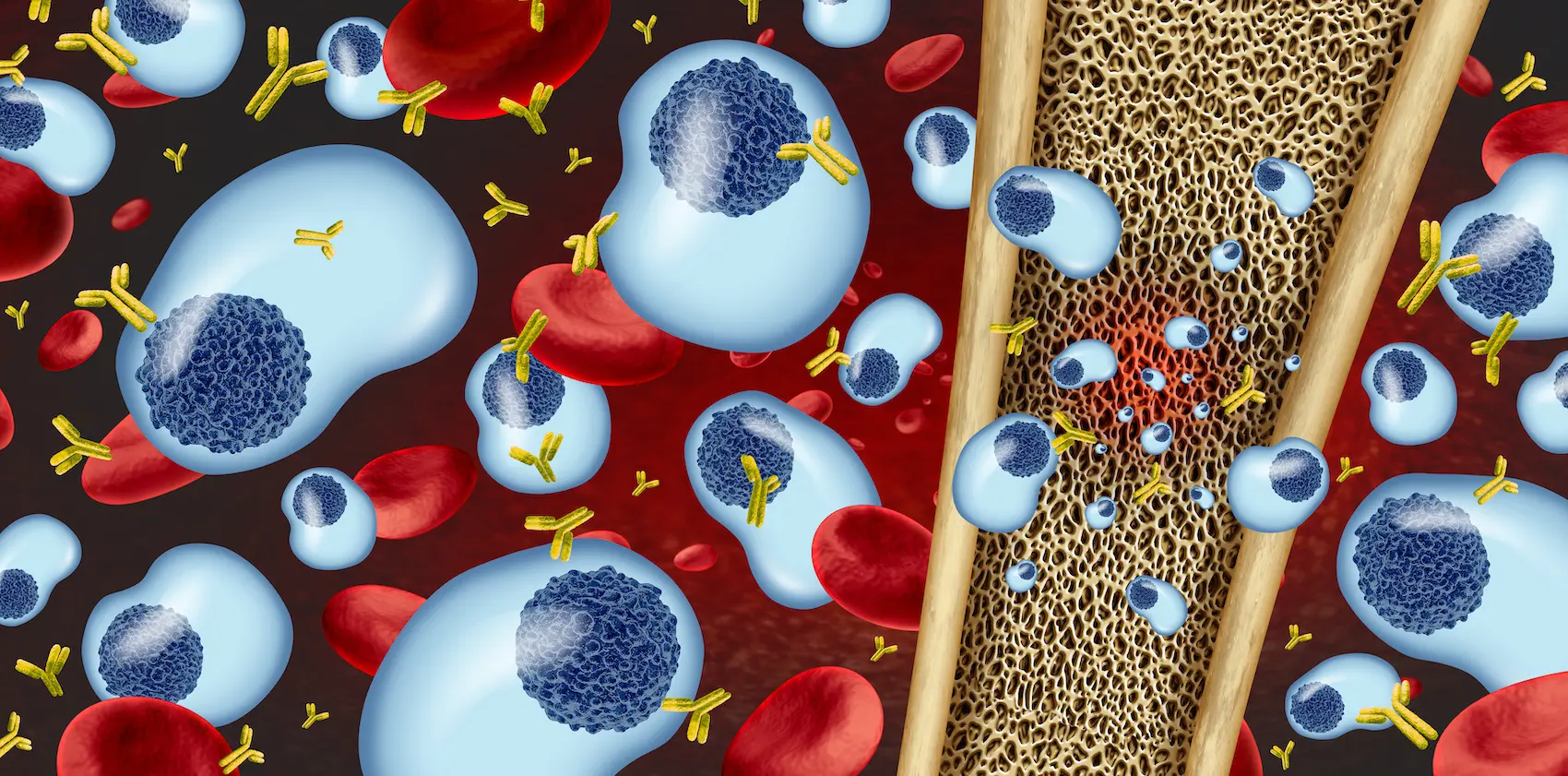Multiple Myeloma Overview
Multiple myeloma is a type of blood cancer that originates in the plasma cells, a kind of white blood cell found in the bone marrow. These abnormal plasma cells multiply uncontrollably, leading to the formation of tumors in multiple bones and causing various health issues. At Fight Bone Tumors, Dr. Kishore B Reddy and our expert team provide comprehensive care for patients with multiple myeloma, employing advanced diagnostic techniques and personalized treatment plans to manage this complex disease.
Symptoms:
Multiple myeloma can cause a variety of symptoms, including:
- Bone Pain: Often in the back, ribs, or hips.
- Fractures: Weakened bones can lead to fractures.
- Fatigue: Caused by anemia and the cancer itself.
- Infections: Increased susceptibility due to compromised immune function.
- Hypercalcemia: High levels of calcium in the blood, leading to nausea, constipation, and confusion.
- Kidney Issues: Abnormal proteins produced by myeloma cells can damage the kidneys.
Early detection and treatment are crucial for managing symptoms and improving quality of life.
Diagnosis:
Diagnosing multiple myeloma involves several tests to confirm the disease and assess its extent:
- Blood Tests: Check for abnormal levels of blood cells, calcium, and kidney function. The presence of M protein and light chains can also indicate multiple myeloma.
- Urine Tests: Detect Bence Jones protein, a marker of multiple myeloma.
- Bone Marrow Biopsy: A sample of bone marrow is examined to detect abnormal plasma cells.
- Imaging Tests: X-rays, MRI, CT scans, and PET scans to identify bone damage and the presence of tumors.
Accurate diagnosis is essential for developing an effective treatment plan.

Treatment Options:
Treatment for multiple myeloma is tailored to each patient and may involve a combination of therapies:
Chemotherapy:
- Uses drugs to kill cancer cells or stop their growth.
- Administered in cycles, often in combination with other treatments.
Targeted Therapy:
- Drugs that specifically target cancer cells without harming normal cells.
- Examples include proteasome inhibitors and monoclonal antibodies.
Immunotherapy:
- Boosts the body’s immune system to fight the cancer.
- Includes drugs like immune checkpoint inhibitors and CAR T-cell therapy.
Stem Cell Transplant:
- High-dose chemotherapy followed by a transplant of healthy stem cells to restore bone marrow function.
- Can be autologous (using patient’s own cells) or allogeneic (using donor cells).
Radiation Therapy:
- Used to target and kill cancer cells in specific areas of the bone.
- Helps to relieve pain and prevent fractures.
Bisphosphonates:
- Medications that help strengthen bones and reduce the risk of fractures.
Our multidisciplinary team collaborates to develop personalized treatment plans aimed at achieving the best possible outcomes for our patients.
Support and Rehabilitation:
Dealing with multiple myeloma involves more than just medical treatment. We offer comprehensive support services to help patients and their families through this journey:
Physical Therapy:
- Essential for managing pain and improving mobility.
Emotional Support:
- Counseling and support groups to address the emotional and psychological impacts of living with multiple myeloma.
Nutritional Guidance:
- Tailored dietary plans to support overall health and manage side effects of treatment.
Follow-Up Care:
- Regular check-ups to monitor the disease and manage any long-term side effects of treatment.
FAQ's
Multiple myeloma is a type of blood cancer that originates in the plasma cells, a kind of white blood cell found in the bone marrow. These abnormal plasma cells multiply uncontrollably, leading to the formation of tumors in multiple bones and causing various health issues.
Common symptoms include bone pain, fractures, fatigue, infections, hypercalcemia, and kidney issues.
Diagnosis typically involves blood tests, urine tests, bone marrow biopsy, and imaging tests to confirm the disease and assess its extent.
Treatment options may include chemotherapy, targeted therapy, immunotherapy, stem cell transplant, radiation therapy, and bisphosphonates.
A stem cell transplant involves high-dose chemotherapy followed by a transplant of healthy stem cells to restore bone marrow function. It can be autologous (using the patient’s own cells) or allogeneic (using donor cells).
Yes, potential side effects include fatigue, nausea, infections, hair loss, and increased risk of bleeding or bruising. Specific treatments may have their own unique side effects.
Managing side effects can involve rest, medications, physical therapy, proper nutrition, and emotional support through counseling or support groups.
We offer physical therapy, emotional support, nutritional guidance, and regular follow-up care to monitor the disease and manage long-term side effects.
While multiple myeloma is generally considered incurable, many patients can achieve long-term remission and manage the disease effectively with treatment.
You can schedule a consultation by calling us at +91 9032027279 or emailing info@fightbonetumors.com. Our team is here to provide personalized care and support.





